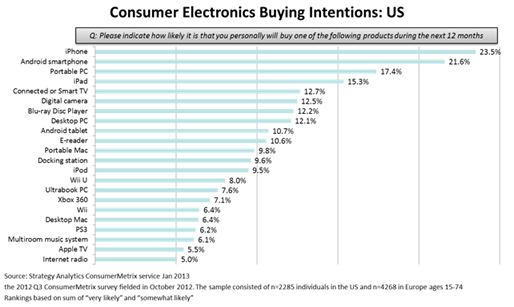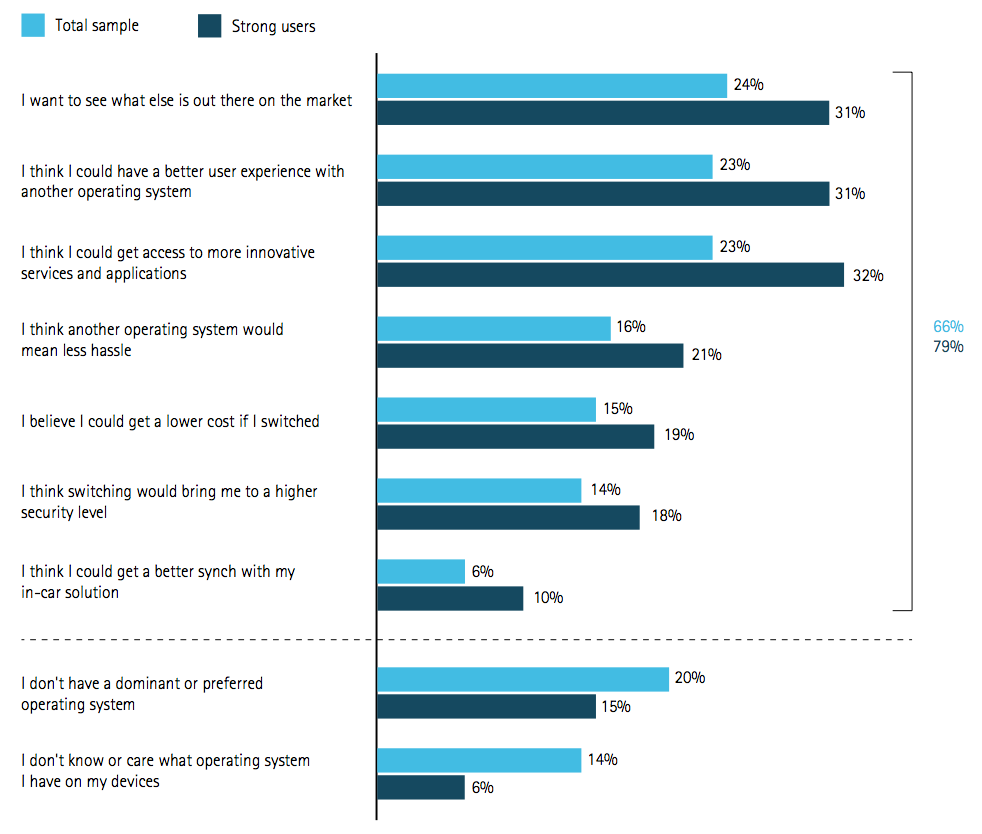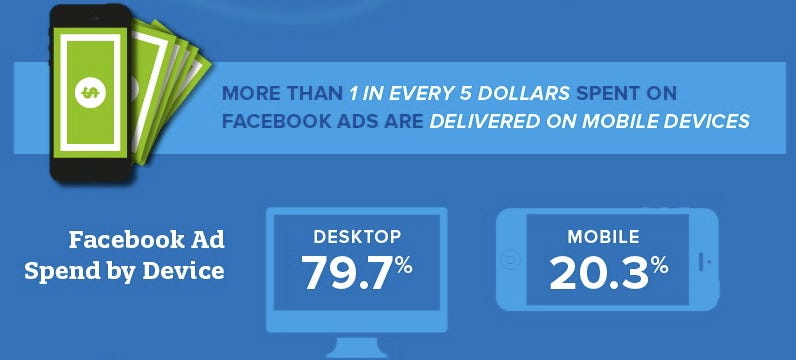Mobile Insights is a daily newsletter from BI Intelligence delivered first thing every morning exclusively to BI Intelligence subscribers. Sign up for a free trial of BI Intelligence today.
Americans Want To Buy iPhones In 2013... (Strategy Analytics via TNW)
The holiday 2012 season may be over, but that doesn’t mean Americans have suddenly stopped being interested in buying gadgets.

In fact, 23.5 percent of U.S. consumers say they are likely to buy an iPhone in the next year, 21.6 percent are looking at an Android smartphone, 17.4 percent want a portable PC and 15.3 percent plan on getting an iPad. These early figures for 2013 come from a study by Strategy Analytics. Interestingly, Apple TV is at the bottom of the list.
...However, Most Don't Care What OS Their Smartphone Runs (Accenture via VentureBeat)
Watch out Apple and Google: Two-thirds of smartphone and tablet owners don’t have strong brand loyalty to any one particular operating system, according to a new study by Accenture. In fact, 24 percent would switch just to see what else is on the market, 23 percent would change for a better user experience, and another 23 percent would ditch their current mobile operating system to "get access to more innovative services and applications."

On the face of it, that’s bad news for current mobile leaders Apple and Google and potentially good news for outside-looking-in mobile wannabe Microsoft.
Will Windows 8 Bring HTML5 To Enterprise Applications? (readwrite enterprise)
When Microsoft gave its first public preview of Windows 8, the now-President of Windows Julie Larson-Green announced "our new development platform" is based on HTML5 and Javascript. To casual observers, that makes sense. HTML5 is roaring to the forefront of development far faster than industry predictions. However, there are a few things to consider:
- HTML / Javascript developers are cheap and plentiful
- HTML is known for its instability
- Fear of the 'script kiddies'
- Developers don't want to learn a new markup
Developers will follow the work, they really don't have a choice. It won't be long before everyone will be doing at least some work in HTML5. That smart enterprises will begin mixing in some of that work now makes sense, but there's not yet good reasons for a complete shift.
HTML5 Is For The Web, Not For Mobile Apps (The Tech Block)
Android, iOS, and Windows Phone all support building applications with HTML5 and other Web technologies. It all sounds great, right? Sounds great, but there is something missing. Everything positive about HTML5 is all about the developer and the creator. Instead, the focus of an app should be on the user and solving their problems or needs. Before falling in love with the points above, you should ask yourself two questions:
- What are the benefits for the customer?
- What are the drawbacks for the user?
You should have a really good reason to build an HTML5 mobile app, and saying "that’s what I know" is not a good one. HTML5 is the right technology for a Web app, but it’s not the right technology for a mobile app.
Three Reasons To Go Native (Artisan)
If you’re like most users, the majority of time spent on your smartphone is with mobile apps. While the mobile Web is undeniably important as a marketing and e-commerce channel, native apps have several distinct advantages:
- Functionality: You can do more with an app.
- Discovery: There is no app store for the mobile Web.
- Engagement: Consumers really do spend more time with mobile apps than the Web.
Of course just because native apps have inherent advantages doesn’t mean every native app is effective. Mobile apps benefit from optimization just as any website would. You should work hard to understand the mobile environment and the people who inhabit it.
Mobile Is 20 Percent Of Ad Spend On Facebook (Kenshoo Social via TechCrunch)
Facebook is making quick progress in growing its mobile advertising business, according to ad platform Kenshoo. It sees 20 percent of all Facebook ad spend going to mobile. That’s a big boost from October when Facebook said 14 percent of its ad revenue came from mobile. Meanwhile, 71 percent of Facebook ad spend targeted to mobile phones goes to Android, further proving Facebook has to focus more on Google’s OS.

Facebook only began showing ads on mobile at the beginning of March 2012, and its unproven ability to profit in the space has made investors hesitant to bet on it. But over the last few months, studies are beginning to show that Facebook mobile ads work and could keep the company successful as its user base shifts away from accessing the service via desktop.
Publisher Leverages Touch To Drive Tablet Engagement Up (Mobile Marketer)
Apple-focused publisher Cult of Mac has seen a 240 percent increase in the number of page views per visit from tablet users since improving its mobile Web experience with more app-like features. Before optimizing the content consumption experience for iOS users, Cult of Mac was seeing an average of 1.66 page views per visit from touch devices. After integrating an Onswipe solution, readers engaged more and now access approximately 5.62 page views per visit, a roughly 240 percent increase since the new experience was introduced in November. "We believe that the tablet is the TV of this generation," said Jason Baptiste, CEO of Onswipe. "By enabling a publisher of any size to deliver a great mobile Web experience ... they're taking advantage of what the tablet makes possible."
Five Reasons Why You Need A Mobile Site (CSS Template Heaven)
In case you needed more. If the mobile version of the site is the only point of your strategy, then you’re missing out. Optimization factor for the mobile version of sites are quickly becoming the most important condition for attracting visitors to the site. Here are the five reasons why you need a mobile website:
- Your visitors are mobile
- Applications are important, but they are no the magic pill
- Mobile version of the site is a source for visitors
- Using the mobile version is more convenient
- A mobile version is much cheaper to run
The creation of mobile version of the site will attract more visitors for less. You should create a mobile version of your site before you lose your potential customers.
Athenahealth Acquires Maker Of Popular Mobile Health Apps (TechCrunch)
Big news from the world of advancing health technology, as athenahealth, the electronic health records giant, announced that it has acquired Epocrates, maker of popular mobile health apps for physicians. Athenahealth wants to combine Epocrates’ mobile expertise with its own cloud-based network to introduce new apps and create advanced mobile work flows to improve provider efficiency, focusing on care coordination, provider-to-provider communication and patient engagement. It also allows athenahealth to expand its provider base of 38,000 with over one million healthcare professionals on the Epocrates network. I would expect more consolidation like this in the healthcare market and incumbent providers look to broaden their tech reach.
Intel Says They Have Mobile Locked Down ... For Next Year (All Things Digital)
Intel has dominated the high-end, performance-oriented desktop space for years, producing some of the most powerful chips on the market. Problem is, desktops are so last decade. The company plans to roll out a new smartphone platform aimed at the low end of the Android market with its "Lexington" project. Intel has its "Bay Trail" quad-core Atom chip on the way to cover the high-end smartphones. New chips to come, too, for the Ultrabooks the company has so loudly trumpeted over the past year. It’s all supposed to last longer, work better and just plain beat competitors like Nvidia and others using ARM-based architecture. But we’ll still have to wait until Christmas to see most of this stuff, while competitors like Nvidia continue to introduce subsequent generations of their successful mobile products. Perhaps by then, the latest and greatest phones you’re seeing launch today might be outdated enough for you to pick up a new one. That’s Intel’s hope, at least.
Samsung Sees Record Profit On Note, Component Sales (Reuters)
Samsung said it sold close to 500 handsets every minute as demand picked up for the flat screens. Shipments of Samsung's flagship Galaxy S III, which overtook the iPhone 4S in the third quarter to become the world's best-selling smartphone, are likely to have slipped to around 15 million in the last quarter from 18 million in July-September. But estimated sales of around 8 million Galaxy Note IIs should more than make up for that. Ahead of full quarterly results due by January 25, Samsung said its operating profit jumped 89 percent to 8.8 trillion won from a year ago. That is 8.6 percent higher than its previous record of 8.1 trillion won in July-September.
Desktop Vs. Mobile Behavior For Travel (Skyscanner via tnooz)
How is the shift to consumers using their mobile devices to search for travel products playing out in the real world? UK-based meta search engine Skyscanner has analyzed data from its desktop and mobile sites to compare how users are searching for flights and making bookings on partner sites. Here is an infographic:


